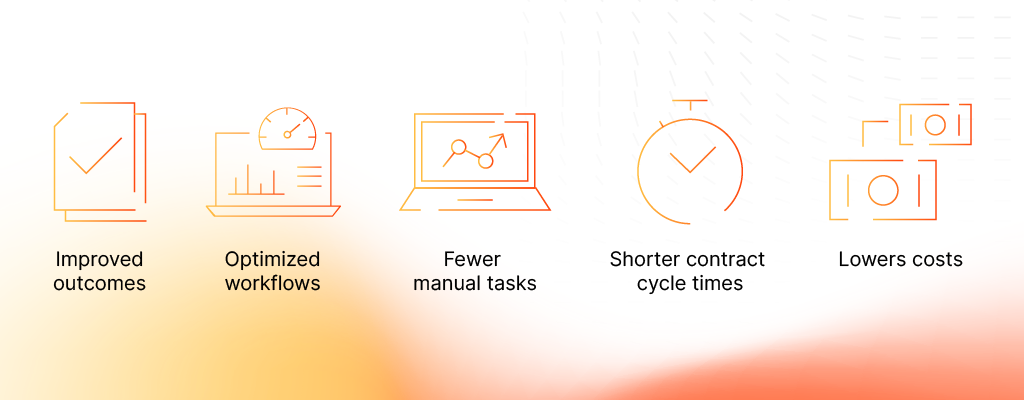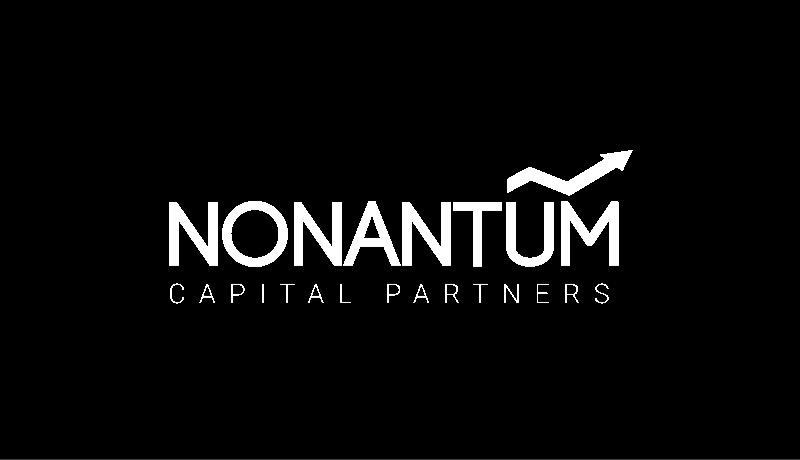Private equity managers and investment banks benefit from outsourcing contracts to a tech-focused alternative legal service provider (ALSP) that offers contract automation software.
In the past, firms outsourced contracts largely to take advantage of additional staffing. Their internal legal and business teams were stretched thin by a growing volume of repetitive agreements, and contract outsourcing freed internal teams to focus on core and mission-critical work.
At this point, however, traditional contract outsourcing services are no longer the best solution available to firms. Instead, contract automation — a combination of contract outsourcing and artificial intelligence (AI) — can provide firms with far greater speed and consistency.
Read on to learn about contract automation, the benefits of automating high-volume, routine agreements, and what to look for in a contract automation provider.
What is contract automation?
Contract automation involves machine learning and AI technology performing or supporting tasks within the contract lifecycle.
AI models use algorithms to analyze data and identify patterns and relationships in that data. Developers train those algorithms by providing the AI models with large amounts of data and adjusting the system’s parameters until it can accurately perform a given task on new data. Eventually, the AI model can offer suggestions, predictions, answers to questions, or other outputs.
Contract automation based on legal AI — AI models geared toward legal use cases — reduces the number of manual tasks lawyers typically perform during contract negotiations, execution, enforcement, and compliance. In connection with outsourcing, legal AI allows an ALSP or freelance lawyers to streamline negotiation and execution workflows, finishing a firm’s contracts faster without involving additional legal support.
How contract outsourcing evolved into automation
Legal AI has made giant leaps recently with new generative AI platforms. Those paying attention, though, know that legal tech and AI have been advancing for years, supporting the work of law firms and in-house legal teams in myriad ways.
Given these advancements, the legal industry has also seen a proliferation of ALSPs, which provide services traditionally performed by law firms — usually with the help of legal tech software and freelancers.
Instead of sending work to traditional contract outsourcing providers, which merely provide additional staffing, legal teams are partnering with ALSPs that can perform the work faster, with better results, and at a lower cost due to legal AI solutions.
The newest generation of ALSPs focuses on human-in-the-loop (HITL) systems. They’re combining industry-specific expertise with their AI models to tackle common issues of inaccurate, irrelevant, and inconsistent outputs. Private fund managers and investment banks can benefit significantly by building a strategic partnership with an ALSP that provides a HITL contract AI application trained on private market agreements.
Why contract automation is better than traditional contract outsourcing

Improved outcomes: Contract automation requires firms to confirm contract playbooks, which encourages standardized language and market terms. Firms often see greater consistency in terms and language used across routine agreements, such as non-disclosure agreements (NDAs), which benefits their obligation management efforts.
Optimized workflows: Contract automation standardizes negotiations, approvals, and signature processes for routine agreements.
Fewer manual tasks: Machine learning and AI capabilities within the contract workflow reduce the number of manual tasks lawyers and other legal professionals complete.
Shorter contract cycle times: Streamlined and consistent contract workflows lead to faster turnaround times than a lawyer could achieve on their own.
Lowers costs: Fund managers and investment banks can lower the costs associated with high-volume, routine agreements when they rely less on outside counsel or their in-house lawyers. Insourcing routine contracts can cost 10x more than firms think.
Which contract types should firms automate?
Asset managers, private fund managers, and investment bankers can outsource:
- Buy- and sell-side NDAs
- Joinders
- Reliance and non-reliance letters
- Vendor contracts
- Engagement letters
The benefits of NDA outsourcing and automation
Sell-side and buy-side NDAs are prime candidates for contract outsourcing. According to a survey by Ontra and Wakefield Research, managers and investment banks often spend a great deal of time on routine NDAs, pulling them away from other work.
These figures are avoidable with NDA outsourcing. When a tech-focused ALSP manages the NDA process, fund managers and investment banks benefit from more consistent and on-market terms and shorter turnaround times.
What does the contract automation process look like?
- Implementing a contract automation solution requires finalizing a contract playbook, which standardizes the ALSP or freelance lawyer’s approach to negotiating the firm’s contracts. Contract playbooks are specific to a contract type, such as a private equity NDA, and contain the firm’s preferred and fallback language per provision. In many cases, private equity firms and investment banks will formalize market terms to reduce potential friction during negotiations.
- The contract automation provider assumes responsibility for negotiating the agreements and oversees execution by the relevant parties. For tech-focused providers, this process involves digitizing the documents and saving executed agreements in a central repository. Firms can then access and analyze structured contract data in a secure location.
- The firm can adjust its resources internally to focus on core functions, such as deal sourcing, due diligence, capital investment, and fund operations.
- The contract outsourcing provider and firm should periodically review the contract playbooks and processes. As business and market conditions evolve, market terms for a type of contract may change, requiring the customer to adjust its playbooks.
Look for an industry-specific contract automation provider
When considering an ALSP for contract outsourcing, look for:
A user-friendly platform: Legal tech adoptions are most effective when the platforms are intuitive to use. When in-house teams can immediately see the benefit of the service and transition to the new process quickly, they’re more likely to fully adopt the platform, giving the firm the greatest chance to recover its return on investment.
Document processing & structured contract data: Document processing, which entails converting documents into a digital format and structured contract data, should be an inherent part of a contract automation workflow.
Contract reporting capabilities: Firms should be able to access their structured contract data through contract analytics and reporting features in the contract automation platform.
A global legal network: The ALSP should be able to connect the firm with freelance lawyers in jurisdictions worldwide. This ensures coverage across time zones, and provides on- and offshore possibilities with rates for every budget.
Industry-specific AI models: Choosing an ALSP for contract automation services requires a thorough investigation into its AI technology. Not all AI is created equal. In fact, generic AI is prone to inaccurate and inconsistent outputs, which introduce unnecessary risk into a firm’s contract lifecycle. Private fund managers and investment banks need to evaluate AI for their specific purposes.


